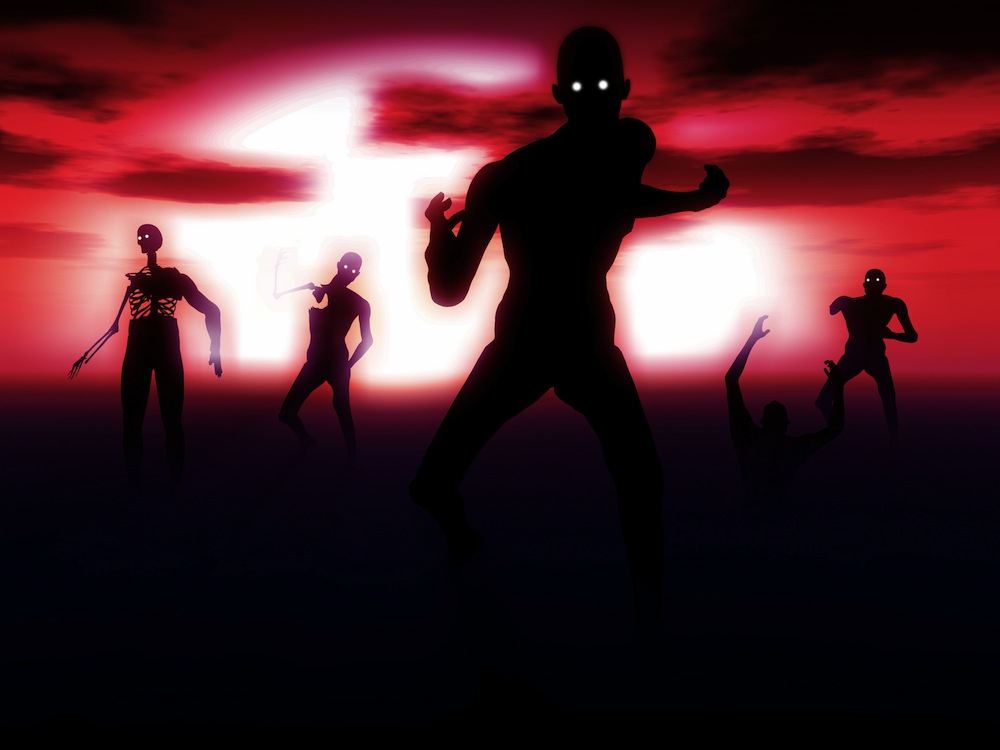'The Walking Dead': How to Survive a Zombie Invasion

The new season of AMC's "The Walking Dead" is just around the corner, which means one thing: Zombies are on the mind.
"Zombie culture" is everywhere these days — TV, comic books, research societies and even zombie-themed 5Ks. So since it seems the brain eaters will rise any day now, you'd better get ready. How will you stay alive among the undead?
Neuroscientist Bradley Voytek and mathematician Richard Smith? (who prefers to write his name with a question mark) have some ideas. Their tongue-in-cheek research paints dire pictures of how humanity would fare in the case of a zombie invasion. [Zombie Facts: Real and Imagined (Infographic)]
Zombie survival kit
Voytek, a postdoctoral scholar at the University of California, San Francisco, School of Medicine, said the best chance of surviving a zombie invasion involves quarantine, a body of water, and leather neck and shin guards, said Voytek.
Once a group of hardscrabble survivors sets up its defensible compound, what always happens? They let someone in who's been bitten and infected, but hasn't yet turned into a zombie.
"Anyone entering the compound from the infected zone must spend a day or two in the quarantined area," Voytek said, adding that the quarantine is the "zombie equivalent of decompression."
Get the world’s most fascinating discoveries delivered straight to your inbox.
Then, a leather jacket with a high collar and some leather boots go a long way. "Leather is hard to bite through," Voytek told LiveScience. "This would be very effective against the surprise behind-the-shoulder or ankle-biter zombies."
If you want to survive the zombie invasion, make sure to use geography and the Earth's plentiful water to your advantage. "Corpses don't do well in water," Voytek noted. "If you can find a yacht, large boat or an island to move to, you'd fare much better."
Zombies by the numbers
Smith?, a math professor at the University of Ottawa, created a model of a fictional zombie outbreak, published in a 2009 study in the Canadian Medical Association Journal.
By his estimates, a city with a population of 500,000 people could become totally zombiefied in four days. But he holds out hope for human survival.
"We can actually deal with zombies," Smith? said. "We just have to be collaborative about it. If we fight them individually, we're not going to be too effective, because most individuals just aren't good at fighting. We have this illusion that we can shoot a moving being in the head from some distance, and that's just not true. But if we pool our resources, learn from experience and apply those lessons again and again, we can get better at fighting zombies as a group."
Smith?, a native Australian, also likes Voytek's water-based defense. "Assuming its origins are on the outside, Australia has geography on its side," Smith? said. "If there's a zombie on a plane — well, it takes 24 [hours] to get to Australia from almost anywhere. There's a lot better chance the zombie would infect others, take over and crash the plane rather than land in Australia."
But both Smith? and Voytek say their tongue-in-cheek zombie research is actually respected.
"Oh, I'm sure some academics turn up their noses at this, but so far, no one's done so to our faces," Voytek said. "My best defense against any complaints of dabbling in nonsense is to also continue doing really good science. I love science, and I love my job. If I have to come down from the ivory tower on occasion, I'm more than happy to do so. It's fun."
The season 4 premiere of "The Walking Dead" airs Sunday, Oct. 13, at 9 p.m. ET.
Follow us @livescience, Facebook & Google+. Original article on LiveScience.


